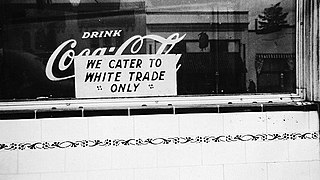Related Research Articles
In the broader context of racism in the United States, mass racial violence in the United States consists of ethnic conflicts and race riots, along with such events as:

The 1967 Detroit riot, also known as the 12th Street Riot and the Detroit Uprising, was the bloodiest of the urban riots in the United States during the "long, hot summer of 1967". Composed mainly of confrontations between African American residents and the Detroit Police Department, it began in the early morning hours of Sunday July 23, 1967, in Detroit, Michigan.
The 2001 Cincinnati riots were a series of civil disorders which took place in and around the Over-the-Rhine neighborhood of downtown Cincinnati, Ohio from April 9 to 13, 2001. They began with a peaceful protest in the heart of the city on Fountain Square over the inadequate police response to the police shooting of unarmed African American 19-year-old Timothy Thomas. The peaceful protest soon turned into a march that went in the direction of the victim's home neighborhood of Over-the-Rhine.

The 1992 Los Angeles riots were a series of riots and civil disturbances that occurred in Los Angeles County, California, United States, during April and May 1992. Unrest began in South Central Los Angeles on April 29, after a jury acquitted four officers of the Los Angeles Police Department (LAPD) charged with using excessive force in the arrest and beating of Rodney King. The incident had been videotaped by George Holliday, who was a bystander to the incident, and was heavily broadcast in various news and media outlets.
The Baltimore riot of 1968 was a period of civil unrest that lasted from April 6 to April 14, 1968, in Baltimore. The uprising included crowds filling the streets, burning and looting local businesses, and confronting the police and national guard.

The history of the city of Portland, Oregon, began in 1843 when business partners William Overton and Asa Lovejoy filed to claim land on the west bank of the Willamette River in Oregon Country. In 1845 the name of Portland was chosen for this community by coin toss. February 8, 1851, the city was incorporated. Portland has continued to grow in size and population, with the 2010 census showing 583,776 residents in the city.

Albina is a historical American city that was consolidated into Portland, Oregon in 1891.

The King assassination riots, also known as the Holy Week Uprising, were a wave of civil disturbance which swept across the United States following the assassination of Martin Luther King Jr. on April 4, 1968. Some of the biggest riots took place in Washington, D.C., Baltimore, Chicago, and Kansas City.
The Cambridge riot of 1967 was one of 159 race riots that swept cities in the United States during the "Long Hot Summer of 1967". This riot occurred on July 24, 1967 in Cambridge, Maryland, a county seat on the Eastern Shore. For years racial tension had been high in Cambridge, where black people had been limited to second-class status. Activists had conducted protests since 1961, and there was a riot in June 1963 after the governor imposed martial law. "The Treaty of Cambridge" was negotiated among federal, state, and local leaders in July 1963, initiating integration in the city prior to passage of federal civil rights laws.
The Wilmington Riot of 1968 occurred in Wilmington, Delaware, in April of that year following the assassination of Martin Luther King Jr. The riot did not cause any fatalities, though there were numerous injuries, arrests, and buildings burned. Despite the quick cessation of rioting, the governor refused to recall the Delaware Army National Guard and Delaware Air National Guard, leaving them in the city as an occupying force until the following year.
The 1967 Milwaukee riot was one of 159 race riots that swept cities in the United States during the "Long Hot Summer of 1967". In Milwaukee, Wisconsin, African American residents, outraged by the slow pace in ending housing discrimination and police brutality, began to riot on the evening of July 30, 1967. The inciting incident was a fight between teenagers, which escalated into full-fledged rioting with the arrival of police. Within minutes, arson, looting, and sniping were occurring in the north side of the city, primarily the 3rd Street Corridor.

The history of racism in Oregon began before the territory even became a U.S. state. The topic of race was heavily discussed during the convention where the Oregon Constitution was written in 1857. In 1859, Oregon became the only state to enter the Union with a black exclusion law, although there were many other states that had tried before, especially in the Midwest. The Willamette Valley was notorious for hosting white supremacist hate groups. Discrimination and segregation were common occurrences against people of Indigenous, African, Mexican, Hawaiian, and Asian descent.

The Urban League of Portland is a service, civil rights, and advocacy organization for African Americans in the Pacific Northwest region. Today, the League is a non-profit, community-based organization committed to providing opportunities and support services for education, employment, health, economic security, and quality of life.

Albina is a collection of neighborhoods located in the North and Northeast sections of Portland, Oregon, United States. For most of the 20th century it was home to the majority of the city’s African American population. The area derives its name from Albina, Oregon, a historical American city that was consolidated into Portland in 1891. Albina includes the modern Portland neighborhoods of Eliot, Boise, Humboldt, Overlook, and Piedmont.

The George Floyd protests were a series of protests and demonstrations against police brutality that began in Minneapolis in the United States on May 26, 2020. The protests and civil unrest began in Minneapolis as reactions to the murder of George Floyd, a 46-year-old unarmed African American man, by city police during an arrest. They spread nationally and internationally. Veteran officer Derek Chauvin was recorded as kneeling on Floyd's neck for 9 minutes and 29 seconds; Floyd complained of not being able to breathe, but three other officers looked on and prevented passersby from intervening. Chauvin and the other three officers involved were later arrested. In April 2021, Chauvin was found guilty of second-degree murder, third-degree murder, and second-degree manslaughter. In June 2021, Chauvin was sentenced to 22+1⁄2 years in prison.

Starting in May 2020, protests following the murder of George Floyd were held in the city of Portland, Oregon, concurrent with protests in other cities in the United States and around the world. By July 2020, many of the protests, which had been held every day since May 28, drew more than 1,000 participants. Protests continued into August, September, and October 2020, often drawing hundreds.

Kent Ford is a co-founder of the Portland chapter of the Black Panther Party in the U.S. state of Oregon in 1969.

A wave of civil unrest in the United States, initially triggered by the murder of George Floyd during his arrest by Minneapolis police officers on May 25, 2020, led to protests and riots against systemic racism in the United States, including police brutality and other forms of violence. Since the initial national wave and peak ended towards the end of 2020, numerous other incidents of police violence have drawn continued attention and lower intensity unrest in various parts of the country.
The 1967 Minneapolis disturbance was one of the 159 disturbances that swept across cities in the United States during the "long, hot summer of 1967".
References
- ↑ Holley, Santi Elijah (June 21, 2017). "'Burn the Town Down'". Portland Mercury . Retrieved 2019-02-08.
- 1 2 3 Serbulo, Leanne; Gibson, Karen (Spring 2013). "Black and Blue: Police-Community Relations in Portland's Albina District, 1964–1985". Oregon Historical Quarterly . 114 (1): 6–37.
- 1 2 "Albina Riot, Portland, Oregon (1967)". BlackPast. November 26, 2017. Retrieved 2019-02-06.
- ↑ "Albina Riot, 1967". Oregon History Project. Oregon Historical Society. Retrieved 2019-02-06.